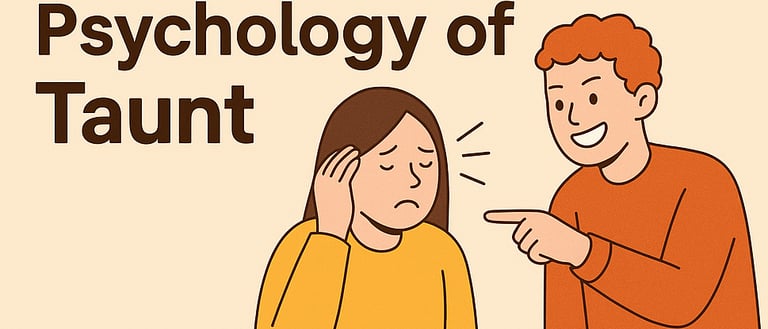The Psychology of Taunt
Is there a reason a person uses taunt to communicate? What is the impact of taunting on the target?
4 min read
A taunt is a provocative remark or gesture with an intention to wound, mock or challenge someone.
By definition, taunt is described as an offensive or unkind remark (a noun) or the act of making such remarks (a verb) with the intention of making someone angry or upset by mocking their failures or shortcomings. (Oxford)
In Asian cultures, taunting often arises from a mix of care, comparison, and control. While the intent may not always be malicious, the impact can still be painful — especially when repeated.
Taunting is seen as a common way of communication especially in an Asian cultures. Indian and Asian cultures emphasise on surface- level harmony over open communication or confrontation. There is avoidance of any form of direct communication leading to a route of taunting or teasing to display disagreement, concern or criticism and sadly, even love and affection.


A taunt can come for many different reasons, what if it's not landing as per your intention and creating a heavy impact on the other person. Let's look at the subtle taunts which maybe used as "motivational nudges" by the people around:
Appearance & Body
“You’d look so much prettier if you lost some weight.”
“Why are you so dark, don’t you take care of yourself?”
“Such a nice dress, but maybe not for your figure.”
Intention: To “encourage” self-improvement.
Impact: Instills body shame, lowers confidence.
Studies & Career
“Look at your cousin — always at the top. You should learn from them.”
“So many people are doing better at your age.”
“Are you even trying hard enough?”
Intention: Push towards success.
Impact: Comparison, self-doubt, anxiety
Marriage & Relationships
“Don’t be too picky, you’re not getting younger.”
“When will we get to see your wedding?”
“Your friends are all settled, what about you?”
Intention: Express concern about future.
Impact: Pressure, feeling inadequate.
Money & Lifestyle
“You still don’t own a house?”
“That’s all your salary?”
“People your age are already doing so much better.”
Intention: Motivate financial growth.
Impact: Guilt, shame, unhealthy competition.
Personality & Habits
“Why are you so sensitive, can’t you take a joke?”
“You’re always lazy.”
“No wonder you don’t have many friends.”
Intention: Push towards toughness or discipline.
Impact: Emotional invalidation, internalized self-criticism.
Taunts maybe done with very good intentions but it often leads to low self- worth. A study in the Journal of Child and Family Studies (2015) found that parental criticism and shaming behaviors directly predicted lower self-worth and higher depressive symptoms in children and adolescents.
Taunts are also done to dominate the other person or make them feel inferior. It is a way to demean or dismiss the person's presence or efforts. This displays the game of power dynamics and setting up of hierarchy in the relationship. Examples:
Workplace
“Oh, that idea? We’ve heard better ones before.”
“You’re too new here to understand how things work.”
Purpose: To dismiss contribution and reinforce seniority.
Family
“Without me, you wouldn’t survive a day.”
“You think you earn a lot? Wait until you pay real bills.”
Purpose: To remind dependence and maintain control.
Romantic Relationship
“No one else would tolerate you like I do.”
“You’re lucky I’m still with you.”
Purpose: To instill fear of abandonment and keep power imbalance.
Friendship / Social Circles
“Oh, you finally decided to show up — we didn’t expect much from you anyway.”
“You don’t get it, you’re too emotional.”
Purpose: To belittle presence and secure dominance in the group.Overall Impact: Builds chronic self-doubt, insecurity, and a feeling of invisibility in the relationship.
Taunts can also be for projecting one's own insecurities in disguise. The inability to face one's own inner doubts or belief system they start to "project" it outward by mocking or belittling another person.
Examples of Projection in Taunts
Someone insecure about their looks says:
“Are you sure you want to wear that? Doesn’t suit you.”
They may feel unattractive themselves.A person struggling with career success says:
“Oh, your job isn’t that big a deal, anyone could do it.”
They may feel inadequate about their own work.A partner afraid of being unworthy says:
“No one else would put up with you.”
Deep down, they fear abandonment themselves.A friend who feels unintelligent says:
“You’re overthinking again, you don’t really get it, do you?”
They might secretly doubt their own understanding
Taunts also show up when feels powerless in a particular situation, to regain that power, they use taunt as a medium to feel powerful again. This is a displaced taunt. Taunting then becomes a way to regain a false sense of control or superiority.
Examples of Displacement in Taunts
At work:
A boss scolds an employee harshly → the employee goes home and taunts their sibling:
“You’re so lazy, you’ll never achieve anything.”In family roles:
A parent feels unappreciated in marriage → taunts the child:
“You’re just like your father/mother, useless.”In peer groups:
A teenager bullied in school → comes home and taunts a younger cousin:
“You’re so stupid, no one will like you.”In relationships:
A partner feeling insecure in their career → taunts the other:
“You think you’re so smart, but you wouldn’t survive without me.”
Childhood also plays an important role. Often, people who taunt have internalized it as a way of communication from early family dynamics. It maybe a behaviour modelled by parents or caregivers. If a child has grown up with taunts as a normalised way of communication, it may adapt to it as way of expression.
In a family setting, taunt could be also used as a tool to bring discipline or toughness in the child.
"Before the world mocks them, let me mock them!" Psychological research shows how a caregivers words hit rock bottom than an outsider. These kind of beliefs by parents/ caregivers have huger impact than others. Studies in developmental psychology show parental criticism and shaming predict much higher rates of anxiety, depression, and low self-esteem than peer bullying.
Taunting can be existing in you or others for many reasons:
Motivational nudge
Dominate or control
Projection
Displacement
Childhood familiar patterns
These process are unconscious in nature, one is not aware while doing it or going through it. This doesn't mean that we don't do anything about it and keep being the same way. We can choose to become aware, grow and evolve as humans for self and others.
SUPPORT
Guiding you through emotional journeys to healing
Contact:
Resources for mental health
rishmitapsychologist@gmail.com
+91 99303 22759
© 2025. All rights reserved.
